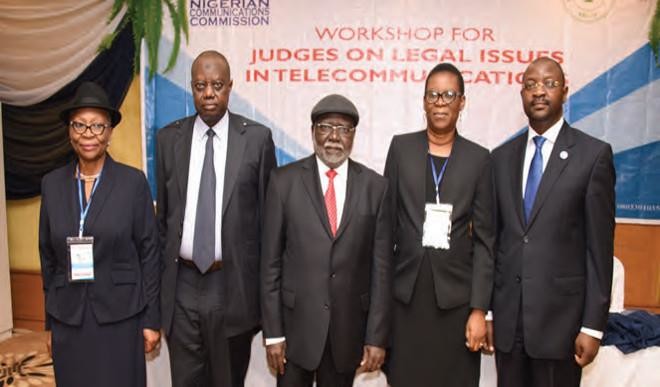NCC hosts capacity building workshop for Nigerian Judges
Emerging trends in Information and C o m m u n i c a t i o n s Technologies (ICT), Internet of Things (IoT) and the new fad Over-The-Top (OTT) were the fulcrum of a two-day workshop hosted for Judges in Nigeria by the Nigerian Communications Commission (NCC) in Abuja recently. NCC did this […]


Emerging trends in Information and C o m m u n i c a t i o n s Technologies (ICT), Internet of Things (IoT) and the new fad Over-The-Top (OTT) were the fulcrum of a two-day workshop hosted for Judges in Nigeria by the Nigerian Communications Commission (NCC) in Abuja recently. NCC did this in collaboration with the National Judicial Institute (NJI).
The Executive Vice Chairman (EVC) of Nigerian Communications Commission (NCC), Prof. Umar Garba Danbatta told the Judges in his welcome address that this vent was the 13th since it was conceptualized 13 years ago, with the primary objective to identify topical and emerging areas of telecommunications “with a view to sensitizing Judges on trends in the telecoms industry.” The EVC who was represented by the Executive Commissioner, Stakeholders Management (NCC), Mr. Sunday Dare told the Judges that “such vital knowledge of the telecommunications industry is key to the development of legal education in Nigeria and will ensure that the Judiciary is able to competently navigate knotty legal issues presented for adjudication”. Danbatta told his audience that distinguished members of the Bench have attended previous conferences have attested to the beneficial impact of interactions at the judges’ Workshops on a personal level and in the exercise and discharge of their duties.
According to him, when the Nigerian Communications Commission (NCC) embarked on the Subscriber Identity Module (SIM) registration exercise in March 2011, not many Nigerians appreciated why the regulator had to do so. The SIM registration exercise which required all mobile phone subscribers to register their SIM cards with their respective mobile network operators was designed to capture the identity of mobile phone subscribers for identity and security management. The role of the SIM registration exercise in the prevention of crime will be discussed during this Workshop.
He also explained that related to the above, SIM-Swap Facilitated Bank Frauds have been on the increase over the years as both the banks and telecom operators’ trade blame on whose responsibility it is to prevent and indeed compensate for SIM-Swap Facilitated Bank Frauds. “As a responsive regulator, the NCC has developed Guidelines on SIM Replacement which sets out the modalities to be followed by all operators when presented with a request for SIM swap by subscribers. This issue is also to be considered in this Workshop”, he said.
“The Workshop will also be examining the emergence of Over-The-Top services (OTTs), a non-traditional means of communication which has left telecommunication regulators all over the world grappling with the issue of whether to regulate or not, whilst balancing the expectations of relevant stakeholders in the industry”.
According to the EVC, digitization is changing ourlives faster than any other technical revolution has done before. It affects our social and working life, our communication, competitiveness, property rights, fundamental rights and privacy. Alongside all the positives aspects of digitization, our society is facing a rather important issue concerning data protection, identity theft and privacy of individuals and businesses. An in-depth analysis of this shall be undertaken to this workshop”. He explained further that “the proliferation of the internet and the decreasing cost of technology has provided millions of users’ access to enormous resources with a resultant increase in cybercrime. Cybercriminals continue to develop new strategies to circumvent cybersecurity measures regardless of their sophistication. We are hopefully that in the continuing course of implementation of the Cybercrime (Prohibition Prevention, etc.)
Act, 2015, cybersecurity will be strengthened in Nigeria. These related issues and more will also be examined in the course of our deliberations.”
